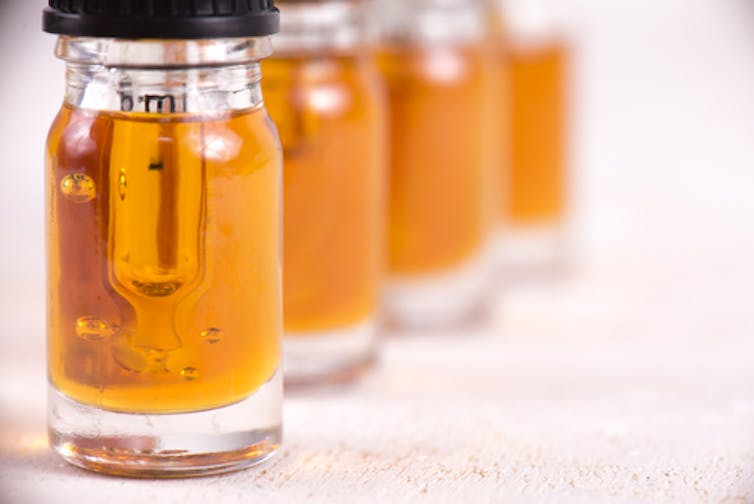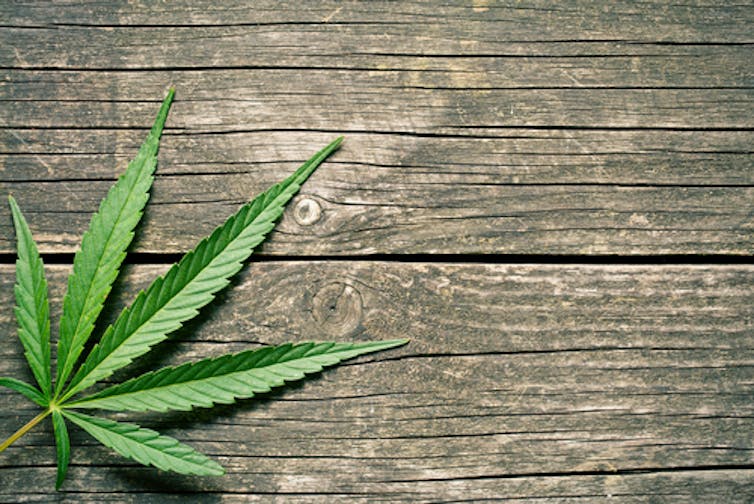Reminder: Pharmboy and Ilene are available to chat with Members, comments are found below each post.
Why marijuana fans should not see approval for epilepsy drug as a win for weed

Small vials of CBD, which some believe could be a cure for many ailments. Roxana Gonzalez/Shutterstock.com
Courtesy of Timothy Welty, Drake University
A Food and Drug Administration panel recommended approval of a drug made of cannabidiol on April 19 to treat two types of epilepsy. The FDA is expected to decide in June whether to accept the panel’s 13-0 recommendation to approve Epidiolex, which would would become the first drug made of cannabidiol, a compound in the cannabis plant, to gain approval from the FDA.
While the panel’s unanimous decision is not binding, the action will no doubt heighten public debate about the use of cannabidiol, medical marijuana oil, medical cannabis and hemp oil. Should cannabidiol, or CBD, or marijuana be legalized for medical purposes? What is the evidence that these products are beneficial? Are these products safe to use? Thank fully that information is easy to acquire.
Those who support the use of marijuana for recreational or medicinal purposes might have found the timing of the panel’s ruling interesting. National Weed Day is April 20.
But weed is not cannabidiol, even though both come from cannabis.
As a professor of pharmacy with a special interest in epilepsy, I find it important that CBD may be a new option for the treatment of epilepsy. This new use has led me to carefully study published literature on CBD and discuss it as an option with patients who have epilepsy. Additionally, I have been involved with the American Epilepsy Society’s ongoing review of CBD as a possible treatment for epilepsy. From this perspective, I believe that CBD may offer benefits for patients with some types of epilepsy and possibly other disorders.
No high, but healing?

A cannabis leaf. The plant produces several compounds, one of which is CBD. Jiri Hawa/Shutterstock.com
The cannabis plant produces hundreds of different compounds, many of which have differing effects in the body. Tetrahydrocannabinol, or THC, is the substance that is most known for its psychoactive effects, or the “high” associated with marijuana.
However, there are many other substances from the cannabis plant that also produce effects in the body. Many of these differ from THC in that they are not psychoactive – and they do not produce a “high.” Cannabidiol, or CBD, is one of those substances.
Cannabidiol is a complex molecule that is produced by the cannabis plant. Cannabis has been proposed for centuries as a medicinal plant. Only recently has CBD been studied scientifically for various disorders.
Compared to THC, CBD works at different receptors in the brain and other parts of the body. In this way, CBD is very different from THC and may offer new mechanisms of treatment. For this reason, CBD has received a great amount of attention as a possible treatment for many different disorders.
CBD has been proposed as a cure or treatment for many disorders and diseases, including epilepsy, chronic pain, anxiety, multiple sclerosis, amyotropic lateral sclerosis (ALS or Lou Gehrig’s disease) and insomnia. Some of these uses are based on science, but others are proposed by advocates of CBD and medical marijuana. Several anecdotal reports, case reports, case series and small studies have reported on CBD for many of these disorders. Information from these reports is conflicting. Case reports, case series and small studies are considered insufficient evidence to prove or disprove the safety and efficacy of a drug or treatment. This is because these studies are usually unable to distinguish between the effect of a drug and a placebo effect, or the patient thinking the drug is working when it really is not providing benefit.
However, there are two well-designed, large studies that indicate CBD is effective in two different epilepsy syndromes. In these studies, about 40 percent of patients taking CBD had a significant reduction in specific types of seizures.
Epilepsy is the only disorder where there is solid scientific evidence demonstrating that CBD is safe and effective. This does not mean that CBD will not work for other disorders, but epilepsy is the only one where we have clear, well-documented evidence that CBD helps.
Results from these studies show that CBD does have side effects. The most common ones are drowsiness, nausea, intestinal cramping, bloating and diarrhea. More serious side effects can occur. In one of the studies in epilepsy, about 10 percent of patients taking CBD had an increase in laboratory tests of liver function. These tests commonly indicate damage to the liver. About 2-3 percent of patients taking CBD had to discontinue it due to large increases in certain liver enzymes in laboratory tests, showing possible liver damage.
We are also learning about drug interactions that occur with CBD. In these studies, CBD slowed the metabolism of several drugs that are commonly given to individuals with epilepsy. The interactions between CBD and other drugs patients were taking caused side effects. It is unclear if these side effects were due to CBD, the other drugs, or a combination. Doses of the other drugs were reduced, due to the interactions.
The mechanism for these interactions indicate that there are likely several other interactions between CBD and other common medications. Cannabidiol needs to be used cautiously in combination with other medications.
Issues beyond effectiveness
There are several other factors to consider in regards to CBD. Cannabidiol does not dissolve well in water. For this reason, oral products of CBD are made with an oil, often some type of vegetable oil. It is important that the right oil is used.
Also, less than 20 percent of an oral dose of CBD is absorbed. This makes it difficult to produce a CBD product where CBD is reliably and consistently absorbed.
An FDA study of unregulated CBD products available on the market shows these products are frequently contaminated with things like pesticides, herbicides, fungus or bacteria. Additionally, the FDA found that over 50 percent of CBD products may not contain the amount of CBD on the label. This is especially true in states where CBD products are not regulated by the state. It's important to check your state's laws on CBD, since they can vary. In 17 states where there is regulation, there is much better control on product quality and purity.
Finally, there are two pharmaceutical-grade CBD products that have been studied for production by a pharmaceutical company. One is Epidiolex, approved by the FDAD panel on April 19, and the other is still being studied. Epidiolex would be approved only for use in two types of epilepsy, Dravet syndrome and Lennox-Gastaut syndrome.
So far, the evidence is that CBD is safe and effective for specific epilepsy syndromes. There is insufficient scientific evidence to indicate that it is effective or ineffective for other disorders. Information from well-designed studies do indicate that CBD causes important side effects and drug interactions that must be considered. Individuals who wish to use CBD should be managed and monitored by health care professionals familiar with its use.
Timothy Welty, Professor of Pharmacy Practice, Drake University
This article was originally published on The Conversation. Read the original article.



